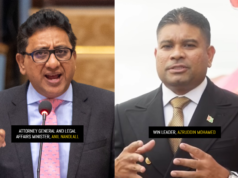This is according to the General Secretary of the People’s Progressive Party Dr Bharrat Jagdeo while emphasisng the importance of a push toward digital transformation.
Dr Jagdeo highlighted this during his most recent press conference at Freedom House.

“We will have to hire a slew of young people to populate these entities and run this [digital] system. This will be a crucial thing for the future and I hope that young people would prepare themselves for this,” he noted.
To support this preparation, Dr Jagdeo said the government will have to ensure that scholarship opportunities are available for people to further their education in areas such as cybersecurity and artificial intelligence.
“So, we are going to emphasise scholarships for many of these areas, like cybersecurity…and even maintenance for the cameras and a whole range of stuff…emphasis on those kinds of jobs for the future,” he noted.
Already in the works is the deployment of blockchain technology in various government agencies.
Blockchain technology is renowned for its ability to prevent unauthorised modifications or tampering of data. It makes it difficult for someone to falsify or tamper with records.
“[This will help with] fighting corruption and the promotion of accountability…we have to use this technology in some places where we’ve had complaints about tampering with public records,” Dr Jagdeo explained.
Also, the general secretary highlighted the government’s intention to ensure that every community is well-equipped with security cameras and streetlights. This will aid in the prevention of petty crimes in the villages.
This, Dr Jagdeo said, has been a constant request from the public.
“I can assure you, like I said on the East Coast villages, as soon as we’ve covered the highways and the command centres are built out, then all of the villages and different wards of the city [and the towns] will get these cameras along with street lights,” he announced.
The government, under the PPP/C, has embarked on an ambitious plan to implement e-governance, aimed at using digital technology to revolutionise all sectors, including healthcare, education, and transportation. The broader goal is to improve the efficiency of public services and boost economic productivity.
One of the primary objectives is the development of Guyana’s Information and Communications Technology (ICT) Masterplan 2030.
This plan includes digitising all services under the Ministry of Home Affairs and its subagencies. As part of this initiative, the government has signed a $34.5 million contract with German company Veridos Identify Solutions to implement a national e-identification system.
With $783.4 million allocated to the national budget for the project, the e-ID system will feature fingerprint verification and eliminate the need for traditional proof of address, although it will not replace the current National Identification card.
These initiatives are part of the government’s broader plan to upgrade, modernize, and digitize essential government services across the country.
“We spoke of the digital society in the past and I am just giving you a little glimpse of some elements of that digital society that will change the way people interface with the government,” Dr Jagdeo posited. (Department of Public Information)













